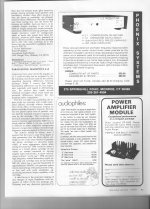It seems to me that would be a type 1 error.Lying is usually when someone FAKES a double blind test and never changes the source.
Not changing the source isn't faking or lying to my mind. It may even point out a little expectation bias.
Doesn't "double blind" mean lying or faking in this manner is virtually eliminated?
Insightful is perhaps a better word,Lying is usually when someone FAKES a double blind test and never changes the source. There is a good explanation for that. Nobody is perfect, but some people or more 'perfect' than others, and this has made me 'successful' in audio design.
Another good explanation is that there is in fact a difference, even when the source is not changed. The objectivists seem to have a very hard time comprehending that the quality of playback can vary from moment to moment, from one period of listening to another - for a variety of reasons. These aspects are what I've had major battles with over the years, that the sound changes in quality over the period of listening, it's "better", or "worse" than it was 5 minutes earlier, say. In the very simple world that many objectivists want to live in, this can't, this is not allowed to happen - therefore, they get results which are all over the place; they give up in the end, and say it must all be in people's heads ... end of progress forward, yet again ...
definitely push buttons.
The knuckle sandwich triggered it, right ? (he has really hot nipples)
Attachments
Help!! ... 35 years ago, it could all have been said yesterday ...Right on, fas42. Look at what I said 35 years ago!
Another good explanation is that there is in fact a difference, even when the source is not changed. The objectivists seem to have a very hard time comprehending that the quality of playback can vary from moment to moment, from one period of listening to another - for a variety of reasons.
I quite happily accept this may be the case. We come to the listening experience in different moods, at different times of the day, in different atmospheric conditions (air pressure and humidity especially) along with a huge number of other variables any of which will change our perception of what we hear. Its this variability that makes one-off single person open listening tests pointless and unrepeatable - they are very difficult to control for especially when you don't think you have to control for them ;-)
These aspects are what I've had major battles with over the years, that the sound changes in quality over the period of listening, it's "better", or "worse" than it was 5 minutes earlier, say. In the very simple world that many objectivists want to live in, this can't, this is not allowed to happen - therefore, they get results which are all over the place; they give up in the end, and say it must all be in people's heads ... end of progress forward, yet again ...
I've never heard anyone say any such thing. For one thing, it would prove the case for the unreliability of uncontrolled listening tests! Care to point me to an example?
Digital replay is very prone to this, it used to drive me crazy decades ago. The current implementations, the way people have their systems set up these days, seem to be better behaved - but it's still something I watch out for.
The usual characteristics are that the track, or recording starts very clean, the treble is in fine order - but as playback continues an edginess or deadness starts to develop in the quality of that treble; the longer it runs the worse it gets. If one were to measure the spectrum of a repeating passage over that period - not that I've done this - you would see the makeup steadily alter.
I've developed several techniques, and approaches over the years to combat this - it's largely under control now ...
The usual characteristics are that the track, or recording starts very clean, the treble is in fine order - but as playback continues an edginess or deadness starts to develop in the quality of that treble; the longer it runs the worse it gets. If one were to measure the spectrum of a repeating passage over that period - not that I've done this - you would see the makeup steadily alter.
I've developed several techniques, and approaches over the years to combat this - it's largely under control now ...
I've developed several techniques, and approaches over the years to combat this - it's largely under control now ...
and the techniques and approaches are...?
With Type 1 errors, I try to match everything with level, absolute phase, and frequency response. These are controllable factors, and I address them. I have gone even farther with power amps in 'matching' the damping factor. All that I find that I need is an A-B comparison, even if I don't know what A or B is specifically. I can be fooled, if someone lies to me, sometimes. Is this really useful to make better audio designs? (to fake differences)
This is not enough, we humans use every kind of input to form our perception. That's why type 1 errors are very common in the tests you describe here. Type 1 errors are eliminated by ears only testing.
Type 2 errors are eliminated by training listeners.
Insightful is perhaps a better word,...
Another good explanation is that there is in fact a difference, even when the source is not changed. The objectivists seem to have a very hard time comprehending that the quality of playback can vary from moment to moment, from one period of listening to another - for a variety of reasons. These aspects are what I've had major battles with over the years, that the sound changes in quality over the period of listening, it's "better", or "worse" than it was 5 minutes earlier, say. In the very simple world that many objectivists want to live in, this can't, this is not allowed to happen - therefore, they get results which are all over the place; they give up in the end, and say it must all be in people's heads ... end of progress forward, yet again ...
You do chat rubbish, why do you put this big divide between objectives and subjectives, when ALL of us who try to contribute something to these threads who are labelled objectives agree that listening tests and subjective views are important.
It is you who is always bashing science and engineers who has a closed and narrow viewpoint .
Digital replay is very prone to this, it used to drive me crazy decades ago. The current implementations, the way people have their systems set up these days, seem to be better behaved - but it's still something I watch out for.
The usual characteristics are that the track, or recording starts very clean, the treble is in fine order - but as playback continues an edginess or deadness starts to develop in the quality of that treble; the longer it runs the worse it gets. If one were to measure the spectrum of a repeating passage over that period - not that I've done this - you would see the makeup steadily alter.
I've developed several techniques, and approaches over the years to combat this - it's largely under control now ...
Its your perception, and the fact that you like many others subscribe to the digital is bad belief...it is the extra detail that is confusing you just listen to analogue sources with less detail and less information for you to process....
Much in the area of controlling static behaviour, preventing or damping movement of system parts, isolating the system from its external environment as much as possible; media players IME are far less prone to have the symptoms. It would be almost impossible to completely eliminate such factors, but a level can be reached where one is not aware of any degradation occurring.and the techniques and approaches are...?
It's also linked to overall system setup; I have not found a single, simple approach that always solves things, usually combinations have to be tried until I get satisfactory behaviour ...
The "whys" ..?? Still a big unknown ... if I had all the answers it would have been published by now ...
Yes, I agree I do have a go at those with a closed and narrow viewpoint - all they have to do is open it up a bit, and everything's hunky dory!!It is you who is always bashing science and engineers who has a closed and narrow viewpoint .
I do not subscribe to the idea that digital is bad!! I have not operated an analogue setup, personally, for listening for about 30 years now, and do not feel any deprivation from doing that! But I do subscribe to the strong belief that digital playback has to be carefully nurtured to get satisfactory quality - yes, digital does have more detail, but unless it is extremely competently reproduced it very easily sounds confused, messy, unpleasant ... for people who don't want to, or haven't the knowledge to optimise digital then analogue playback can make it easier to "just enjoy the music" ...Its your perception, and the fact that you like many others subscribe to the digital is bad belief...it is the extra detail that is confusing you just listen to analogue sources with less detail and less information for you to process....
Last edited:
Hi,
External environment including the vagaries of the mains, correct?
I feel that this is in a big way responsible for the changes in perceived sound quality.
Another factor is our own state of mind. We need to be brave enough to admit to ourselves that we can just be imaging things too.
Cheers,
Much in the area of controlling static behaviour, preventing or damping movement of system parts, isolating the system from its external environment as much as possible;
External environment including the vagaries of the mains, correct?
I feel that this is in a big way responsible for the changes in perceived sound quality.
Another factor is our own state of mind. We need to be brave enough to admit to ourselves that we can just be imaging things too.
Cheers,
In general: All science wants to do is find out how the world works. And its using the scientific method to achieve knowledge about the world. If something is proven to be correct its accepted by the scientific community.Yes, I agree I do have a go at those with a closed and narrow viewpoint - all they have to do is open it up a bit, and everything's hunky dory!!
But science is very closed minded where the scientific method is not followed and making claims without providing evidence just as it should be.
In audio quackery is everywhere, unfortunately, and this prevents real progress. Hopefully no one believes me when I say that eating cat excrements improves your ability to hear fine detail in sounds, you just have to try it for yourself. But we hear similar made claims all the time in audio: You just have to try it for your self. I think that kind of behaviour is an insult to people.
- Status
- Not open for further replies.
- Home
- Member Areas
- The Lounge
- Funniest snake oil theories


